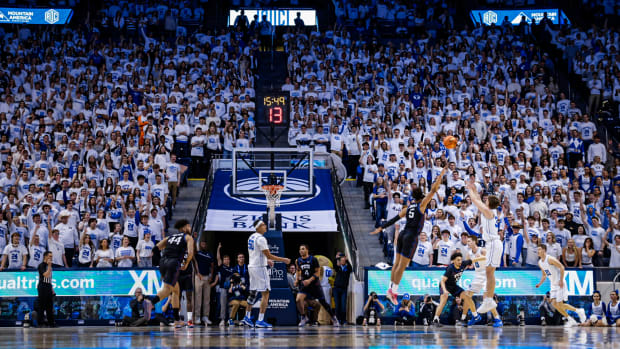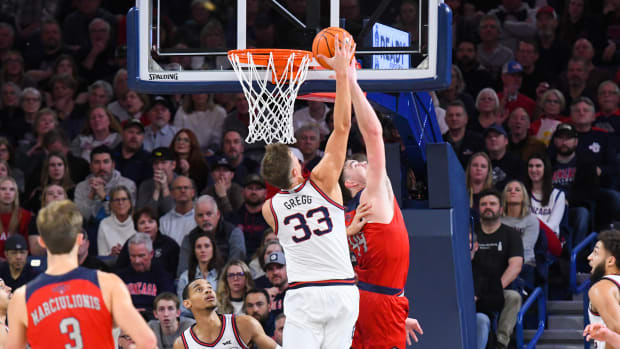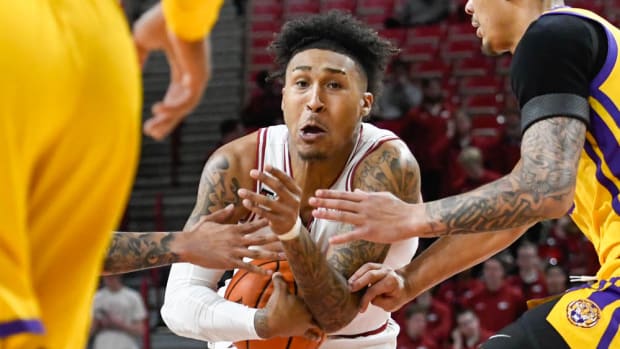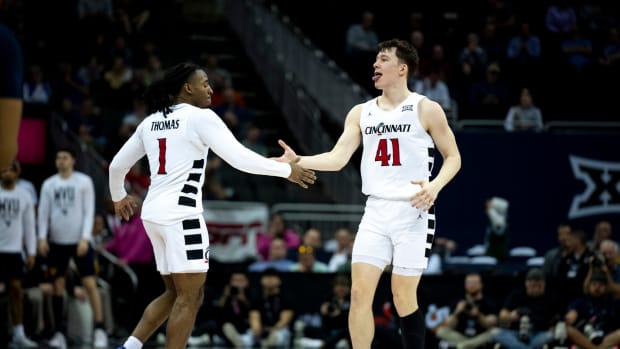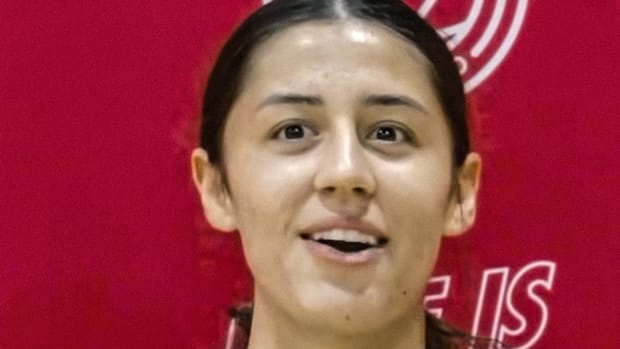Why Maryland Receiving FBI Subpoenas Should Worry Other College Programs, Basketball Players
The scope of the federal prosecution of college basketball corruption continues to expand. On Friday, the University of Maryland acknowledged receipt of two sets of grand jury subpoenas sent from U.S. Attorney Geoffrey Berman of the U.S. District Court for the Southern District of New York. Last September, in that same court, several prominent figures in college basketball were charged with federal crimes related to bribing college basketball recruits. Maryland claims that it fully complied with the subpoenas, which are requests for documents “under penalty;” a failure to comply with a subpoena can lead to criminal or civil punishments. The subpoenas are dated on March 15 and June 21. Maryland’s disclosure was in response to an investigative report and accompanying Freedom of Information Act requests by Yahoo Sports’ Pat Forde, Pete Thamel and Dan Wetzel.
Breaking down the subpoenas and their relationship to the college hoops case
In his subpoenas to general counsel of the University of Maryland, Berman demanded several sets of materials.
(i) Subpoena related to Silvio De Sousa
One request was for documents—including emails, texts and letters—relating to the recruitment and eligibility of Silvio De Sousa, a rising sophomore at the University of Kansas and a 6’9” power forward on the Jayhawks. Several major programs, including Maryland, Kentucky and Florida, had recruited De Sousa while he was five-star recruit at IMG Academy in Bradenton, Florida. In August 2017, the now-19-year-old selected Kansas, which is sponsored by Adidas. De Sousa’s decision stunned college basketball recruiting experts. Maryland, which is sponsored by Under Armour, was widely regarded as the favorite to land him.
Breaking Down Kevin Ollie's Case Against UConn and the University's Likely Defenses
De Sousa has been a person of interest to federal investigators for some time. As SI’s Dan Greene explained in April, representatives from Adidas are believed to have paid a guardian for De Sousa, who spent most of his childhood in Angola, as an inducement for him to attend Kansas. Although not named in April’s superseding indictment (which is an indictment that adds additional charges), De Sousa appears to fit the description of a recruit detailed in it. De Sousa’s guardian is alleged to have received a $20,000 payment in September 2017. Adidas executive James Gatto and an unnamed representative of Adidas allegedly arranged for this payment, which was purportedly designed to assist De Sousa in getting “out from under” a “deal” he had already negotiated to attend a different college. According to the superseding indictment, a rival to Adidas in the athletic apparel world sponsored this particular college. Maryland could be that college, which is a key reason why the school has been subpoenaed.
To be clear, Maryland denies any wrongdoing. It is likewise worth stressing that being subpoenaed does not imply wrongdoing. As noted above, a subpoena is a request that compels production of documents or witness statements relevant to a case or investigation. Many persons and businesses that have done nothing wrong can be subpoenaed. Further, De Sousa’s guardian, Fenny Falmagne, has steadfastly denied that either he or De Sousa received any illicit payments.
Months after De Sousa announced his decision to attend Kansas, he reclassified to the class of 2017 and was able to graduate high school by December 2017. He then joined the Jayhawks this past January. Jayhawks head coach Bill Self used De Sousa as a reserve forward for the remainder of the season, and he averaged 4.0 points and 3.7 rebounds per game. He also helped the Jayhawks advance to the Final Four. De Sousa is expected to play a much larger role for the Jayhawks this upcoming season.
The subpoena related to De Sousa mandated that Maryland search for responsive documents that were potentially locatable on cell phones, pagers, tablets, laptops, desktops, personal email, cloud storage and social media accounts used by Maryland employees, officers and board members. The federal government wants to see if there is evidence of anyone connected to Maryland being part of a criminal conspiracy to pay De Sousa or his guardian in exchange for De Sousa’s alleged pledge (later rescinded) to attend Maryland and play for the Terrapins and head coach Mark Turgeon.
Maryland claims that none of the records it provided in response to the subpoenas revealed wrongdoing by its coaches, staff or players. None of these persons, according to the university, broke any laws or NCAA rules—at least as far as the school can tell.
Obviously, Maryland is not a neutral party in assessing whether its employees broke rules or laws. Like other schools implicated in the FBI college basketball probe, it will take months, if not years, before there is resolution on how to interpret the conduct of major D-I basketball programs during the period in which the FBI has investigated.
(ii) Subpoena related to Diamond Stone
Berman also demanded essentially the same set of documents related to another former Terrapins recruit, whose name is redacted from Maryland’s records release. That recruit is widely believed to be Diamond Stone, a 6’11” center who enrolled at Maryland in 2015 and who played one season there. In February, Yahoo Sports reported that, according to FBI documents, then-NBA agent Andy Miller’s agency, ASM Sports, arranged for a payment of $14,303 to Stone during his freshman year at Maryland.
For his part, Turgeon insists that he had no awareness of any payments to Stone. Also, when Stone signed with an NBA agent in April 2016, Miller was not the one hired—instead, Stone retained Jim Tanner and Derrick Powell of Tandem Sports + Entertainment. If Stone had been illicitly paid to hire Miller, who relinquished his National Basketball Players Association agent certification in December 2017, it appears Stone backed out of that arrangement.
Examining the NCAA Probe: Did the FBI Unfairly Target Christian Dawkins?
In the 2016 NBA draft, Stone, who had been a five-star recruit and a McDonald’s All-American, was taken by the New Orleans Pelicans in the second round with the No. 40 pick. He was then traded to the Los Angles Clippers. By most accounts, Stone would have been well served staying in college for another year—assuming, of course, he would have remained NCAA eligible. He has played in just seven NBA games over the last two seasons. Most of Stone’s pro basketball career has been spent in the G League. Still only 21 years old, Stone has starred for G League teams affiliated with the Clippers, Golden State Warriors, Chicago Bulls and Utah Jazz. Stone is currently playing for Utah’s summer league team in hopes of earning an NBA contract.
(iii) Subpoena related to Christian Dawkins
In addition, Berman demanded that Maryland turn over documents related to sports management executive Christian Dawkins. Dawkins has become a familiar name in college sports, albeit not for reasons he wishes. Along with Gatto and other significant persons in the industry, Dawkins was indicted last September with multiple charges for felony wire fraud and money laundering. Prosecutors believe that Dawkins is a crucial figure in the college hoops scandal.
Between 2015 and 2017, Dawkins served as a runner for Miller and ASM Sports. Dawkins is accused of facilitating hundreds of thousands of dollars in payments to high school basketball players and their families. In exchange, the recruits were expected to attend colleges sponsored by Adidas and to become more inclined to sign endorsement deals with Adidas. Dawkins is also believed to have aided Miller, his boss, in landing 10 players to represent in contract negotiations with NBA teams. According to Yahoo Sports, Dawkins also made the $14,303 payment to Stone on behalf of ASM Sports.
As revealed by Jake Fischer and Jon Wertheim in a recent SI exclusive, the government’s case against Dawkins has been undermined by revelations that the lead FBI agent who arguably set up Dawkins misused federal funds during the probe. Should Dawkins go to trial, he would likely contend that any and all incriminating evidence and testimony collected through the compromised agent ought to be suppressed.
(iv) Subpoena related to Orlando Ranson
Lastly, Berman commanded that Maryland provide documentation related to Orlando “Bino” Ranson, whom the subpoena identifies as a “former Maryland employee” but the university insists Ranson is a current employee (also a quick search on Maryland’s website directory shows Ranson is presently listed as an assistant coach). Maryland was asked to reveal if it had assembled an “investigative file” regarding any allegations of potential misconduct by Ranson in relationship to NCAA rules. As reported by Don Marcus of The Baltimore Sun, Ranson was Maryland’s lead recruiter for Stone.
The seven key legal takeaways
At first glance, the subpoenas may not seem terribly significant. The government has requested documentation from the University of Maryland about a high school player it recruited but failed to land, a former player who left the Terrapins two years ago, a runner who faces multiple felonies but whose ties to the school are unproven and an assistant coach who may or may not be connected to the former player. To the extent Maryland is on the map of the college hoops corruption scandal, it seems more on the periphery than in the center. Further, as noted above, Maryland insists the documents found in compliance with both subpoenas reveal no wrongdoing.
Could a Rogue FBI Agent Derail the NCAA Corruption Probe?
A deeper look, however, suggests the subpoenas should be worrisome to not only the University of Maryland but also to other colleges and players—including those players already in the NBA. Here are seven legal implications:
1. Maryland clearing itself of wrongdoing doesn’t clear Maryland of wrongdoing. Maryland’s claim that it found no signs that school officials and coaches broke any laws or NCAA rules is a claim that the school’s governing entities will want to verify. Just like with any implicated school, it’s possible that the Justice Department, the NCAA and the relevant conference (in this case the Big Ten) could reach different conclusions about whether any wrongdoing took place. It will likely be years before all of those entities close the book on a multifaceted investigation into college basketball corruption.
2. Even schools that fail to land the big recruit can be brought into the investigation and prosecution. Maryland fans may wonder why their program has been implicated. For one, De Sousa didn’t pick Maryland, which implies that any wrongdoing connected to the Terrapins didn’t benefit the program. Second, the team has disappointed in recent years (the Terrapins failed to qualify for the 2018 NCAA tournament and lost in the Round of 64 in 2017), which suggests that any wrongdoing hasn’t paid substantial dividends. The Justice Department would assert that those are irrelevant points. Federal prosecutors aren’t interested in the basketball results of what they regard as criminal bribes. The prosecutors care about whether the bribes occurred and whether they can eventually convince jurors that those bribes were the fruits of felony conspiracies.
3. Adidas may not be the only apparel company implicated. The idea that Adidas, but no other apparel company, is connected to illicit payments to elite basketball recruits has struck many as unlikely. After all, if persons connected to Adidas could net top recruits for Adidas-sponsored college programs and then later persuade those recruits to sign endorsement deals with Adidas, rival companies would likely detect this pattern. Some of them, perhaps, may have been poised to mimic it. With that in mind, Under Armour sponsors Maryland. If it could be proven that representatives of Under Armour engaged in the same kind of conduct allegedly undertaken by Gatto, Dawkins and others, then additional indictments could surface.
4. The potential witness list keeps growing. Whether Ranson, Miller or even Stone or De Sousa engaged in types of conduct that the Justice Department regards as criminal, each is believed to have information relevant to prosecutors. Each should thus hire an attorney if all of them have not done so already. The same is true of anyone whom the government believes has pertinent information in this investigation—depending on the nature of that information, it could lead to the imposition of criminal charges. Also, the list of known subpoenaed schools keeps climbing—Arizona, Auburn, Kansas, Louisville, Maryland, Miami, North Carolina State, Oklahoma State and the University of Southern California. And there may be other subpoenaed schools that media outlets are unaware of. Investigators will look not just into current employees at those schools, but past employees and student-athletes too. All of this means that persons who may believe they no longer have anything to do with targeted schools may soon be spending time in depositions and other legal hearings because of their past associations to those schools.
Summer Top 25 Reset: How Draft Decisions Affect the 2018–19 Preseason Rankings
5. The possibility of more prominent names being charged keeps rising. There’s a good chance none of the persons charged in the college basketball corruption case will ever go to trial. Approximately 90% of persons charged with federal crimes resolve them through plea deals. The simple truth is this: Being charged with a federal crime is the start of a nightmarish experience that usually leads to some form of capitulation. Federal prosecutors win far more than they lose. Criminal defense attorneys often counsel their clients to negotiate a deal with federal prosecutors where the defendants plead guilty to lesser offenses. In such deals, the defendants also agree to turn over implicating evidence and to serve as cooperating witnesses to help federal prosecutors prosecute the “bigger fish” (which in this context may mean college head coaches, rather than the assistant coaches who have already been charged). It’s clear the Justice Department believes the number of persons and schools involved in college basketball corruption is expansive. Federal prosecutors know that those who have been charged (as well as their loved ones) might gradually become more anxious about the possibility of a trial. Chances are, those charged will become more and more willing to cut a deal and implicate others the longer this plays out.
6. The NCAA could suspend players who have been accused of wrongdoing and punish the offending schools. De Sousa and the Jayhawks coaching staff are no doubt aware how Louisville and the NCAA handled allegations against fellow five-star recruit Brian Bowen: Last fall the university suspended Bowen indefinitely and in May the NCAA ruled Bowen ineligible for the 2017-18 season. These moves led Bowen—whose family member is alleged to have accepted payment for him to play for the Cardinals—to turn pro (as SI’s Jeremy Woo notes, Bowen could play in the G League next season). If allegations against De Sousa are proven, he too could face NCAA discipline. Further, Kansas could eventually be found to have run afoul of NCAA rules.
7. Impact on coaches’ employment contracts and the potential of “for cause” firings. Any coach who is implicated in the corruption probe and who a university would like to see fired could face a costly outcome. Coaches’ contracts usually contemplate two kinds of firings. The first is a firing “without cause.” This is the standard condition for firing a coach. It occurs when a school simply decides it wants to go in a different direction and bring in a different coach. Usually the fired coach’s contract contains a liquidated damages figure that ensures he or she is paid a substantial portion on the remainder of the contract. The second kind of firing is one “with cause” or “for cause.” This is where the school believes the coach engaged in such serious misconduct that the school is relieved of any obligation to pay the remainder of the contract. For cause firings often lead to litigation. I’ve written SI articles about the “for cause” firings of Rick Pitino (who lost about $39 million in future payments) and Kevin Ollie (who lost about $10 million in future payments) and how those two former coaches are using legal processes to combat their firings. In the Maryland situation, you can be sure Turgeon and his attorneys are closely monitoring the situation. They will want to ensure that if Maryland seeks to fire him at some point, the school knows Turgeon will use the legal process to oppose any firing “for cause.”
Dan Hurley on His Plan to Rebuild UConn, Learning From Auriemma and Calhoun and More
Let’s not forget the defense: Why is paying a recruit a crime?
The basic premise that paying an elite high school basketball player to attend a particular college is evidence of criminal conduct should not be accepted as a given or as an absolute truth.
It remains to be seen if the federal government can prove that breaking NCAA rules (which are policies promulgated by a private, non-profit organization and are thus not “laws”) also constitutes very serious criminal acts.
Along those lines, it’s not certain who are the “victims” of college basketball fraud. The player and his family receive financial compensation and the school he attends lands an elite recruit. The recruit then helps the school win games and generate revenue.
It is of course more complicated than I just depicted it. Some would argue those paying recruits are unethical and deceptive individuals. Further, the government stresses, the schools could be considered victims since they are enrolling student-athletes who are ineligible.
For more on the government’s theories of college basketball crime and the key defenses, please check out my SI article that examines the most critical arguments and also my Harvard Law Review Blog article, “The ‘Crime’ of Paying College Basketball Stars: Form over Substance?”
Michael McCann is SI’s legal analyst. He is also Associate Dean of the University of New Hampshire School of Law and editor and co-author of The Oxford Handbook of American Sports Law and Court Justice: The Inside Story of My Battle Against the NCAA.
